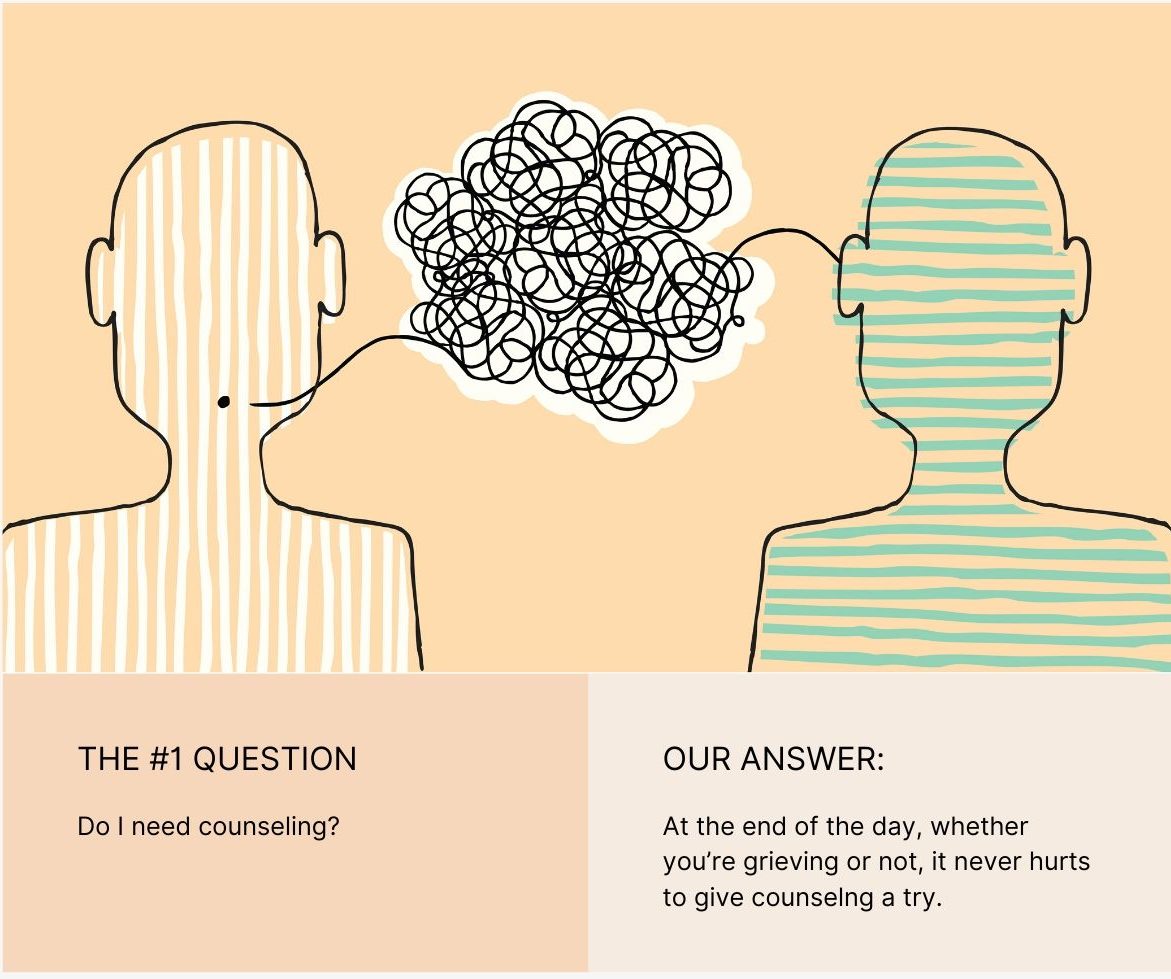Demystifying Grief Counseling: Five FAQs
/ Coping with Grief : Eleanor Haley
What is grief counseling? First, we want to clarify what we mean by 'grief counseling'. When we use the terms 'grief counseling', we're using it to mean any type of one-on-one, couples, or family therapy, provided by a licensed counselor, to someone(s) who experienced a significant loss.
Ideally, the counselor will have experience and expertise related to grief and bereavement, though their backgrounds will vary. The impetus for seeking therapy is challenges related to coping with loss and adjusting to life in its wake. Though, a person may find they address a wide range of issues throughout their counseling journey, whether they set out to do so or not.
Do I need grief counseling?
The question many people start with - and thus the most common question we hear - is something along the lines of "Do I need grief counseling?" or "How do I know I should go to grief counseling?"

I'm afraid our answer isn't the most satisfying for people who want black-and-white guidelines, but I also think it's the simplest. What we say is - if you are even slightly open to counseling - it never hurts to give it a try.
People often think there's a threshold of severity they should surpass before seeking counseling. Just as a person might wait until a fever spikes to a specific temperature before calling the doctor, they believe their grief has to hit a certain intensity before calling a counselor. However, therapeutic experiences can be helpful to anyone, even people who are feeling pretty 'okay' in their life.
For example, counseling can help a person explore their experiences in a supportive, confidential, and non-judgmental environment. Also, counselors can provide psychoeducation and help clients identify coping tools and resources for dealing with a wide range of stressors.
We know this may seem overly simplistic, logistically speaking. There are barriers related to access and cost that we'll address a little in the next few FAQs. But generally speaking, in terms of whether you should try it or not, if doing so doesn't place undue strain on your wallet or your time - then we say go for it. For our friends who want a little more concrete advice on this topic, try these articles:
- What is "Normal" in Grief?
- When Grief Goes from Just Plain Miserable to Problematic
- "Normal" vs Not-so-"Normal" Grief
What should I look for?
Get out a piece of paper and do a little brainstorming about what you'd like out of this experience. Ask yourself:
- Do I want to be seen on my own or with other people?
- Do I need a certain time of day or days of the week?
- Do I want to, or need to, consider teletherapy?
- Do I need to see someone in a certain area?
- Do I have preferences about the therapist's demographics?
- Do I want to see someone who also has expertise in things like anxiety, trauma, etc?
- Do I want a hands-on, structured type of therapy or one that is flexible and open-ended?
- Do I know anyone who can offer me a recommendation?
Though the ideal scenario may not be possible, it helps to think about what you need and want from this experience. Knowing this can help you refine your search and determine what questions you ask. All that said, we encourage you to remain as flexible as possible. Ultimately, the therapists and therapies you find helpful might surprise you.
What questions should I ask?
Quite often, people schedule with a therapist without asking any questions. It's okay if you prefer not to ask questions, BUT you are more likely to find the right fit the first time around if you ask a bit about their background and approach.

I think people are hesitant to ask potential therapists questions for a handful of reasons. First, therapy is a little scary for some people. While some respond to fear and anxiety by asking many questions, others will do the opposite.
Second, many people are under the misconception that therapy is therapy and underestimate the vast differences in therapeutic approaches in personal style.
Finally, I think many people just don't know what to ask! You may have already written down a few questions in your brainstorm, so start with those. Beyond that, you may want to ask about:
- Their credentials: The letters behind their name may indicate their educational background as well as the type of license they hold. We do always recommend that you see a licensed counselor.
- Their expertise: Do they have training in particular areas that are important to you? Specifically, ask about their background working with people who are grieving.
- Their therapeutic approach: Therapeutic approaches vary widely. It may be helpful to know what a therapist's particular therapeutic approach is like. Check out this list of types of therapy for more information.
How am I going to afford counseling?
The cost of out-of-pocket therapy presents a significant barrier to many people. Even if you can afford a session or two, the idea of regularly paying session fees may seem impossible.

Most people will need to need to research their options for subsidizing the cost of therapy. Here are a few avenues to try:
Insurance: Insurance is a go-to for many people. If you have health insurance, look into your plan's mental health benefits and the process for accessing counseling.
Employee Assistance Programs (EAP): If you have benefits through your workplace, you may have access to an EAP. If so, there's a good chance this benefit provides you with some free counseling sessions. Again, we encourage you to research your particular benefits, as they vary from program to program.
Sliding-Scales: If you have to pay out-of-pocket but can't afford the therapist's rate, ask them if they have the option to pay on a sliding scale. Using a sliding scale, some therapists will offer counseling at a lower cost based on what the client can afford to pay.
Local hospices and grief centers: Check to see if there are hospices and grief centers in your local community. These types of organizations often have cost-effective grief counseling options.
I've made an appointment - now what?
Hopefully, your future therapist has provided you with enough information to take the first step. If you still have questions and anxieties, that's okay. The first session should be about getting to know each other - them getting to know you - and you learning more about their approach and style.

Try to be open to the process and know that you will feel uncomfortable at times. That's kind of the point!
After a few sessions, hopefully, you'll feel like you're getting the hang of it. If not, it's okay to share your uncertainty with your therapist. You may find that it's something you can work through.
You may also ultimately decide that this therapist or their approach is not the right fit for you. Therapy can be a bit like dating at times; you may have to meet with a few people before finding the right fit. Though it's undoubtedly true that therapy, in general, will not feel right to everyone, we encourage you not to give up after only one experience.
Share your tips for seeking grief counseling in the comments below. Subscribe.
We wrote a book!
After writing online articles for What’s Your Grief
for over a decade, we finally wrote a tangible,
real-life book!
What’s Your Grief? Lists to Help you Through Any Loss is for people experiencing any type of loss. This book discusses some of the most common grief experiences and breaks down psychological concepts to help you understand your thoughts and emotions. It also shares useful coping tools, and helps the reader reflect on their unique relationship with grief and loss.
You can find What’s Your Grief? Lists to Help you Through Any Loss wherever you buy books:





Taylor Hansen September 28, 2020 at 11:54 am
Thanks for mentioning asking about their expertise and what kind of therapeutic approach they take. My brother just passed away in a bad car accident and I’ve been having an extremely hard time with it since we were really close. I’ll have to talk to a grief counselor so I can try to move on with my life. https://gfc-utah.com/grief-healing/
IsabelleS September 29, 2020 at 11:24 am
Hi Taylor, I am so sorry for your loss and for the tremendous pain you are experiencing. If you are looking for a grief counselor, we suggest you check out https://grief.com/grief-counselor-directory/. Hope this helps a bit. All the best to you.
Regina Nunley July 11, 2020 at 5:36 pm
After losing my love of my life in 2018, I was lovingly suggested that I look into a grief group here in Los Angeles, and man am I glad I was able to join. I love my group- we have worked together over a year – of an 18 month program – every other week meetings- and it/ they have saved my life. My personal counselor is also amazing – but I found that our talk- therapy is not to he best fit for what I’m dealing with. I decided to just be engaged with my group for these next few months. Once our group is formally over, I do plan to keep connected to them, because I adore them, and because I feel only those who’ve been in my shoes can truly get where I’m at. It’s a very difficult place to be.
anonymous June 29, 2020 at 7:58 am
Speaking from my own personal experience, I must speak up and say I disagree strongly with your written words:
“What we say is-if you are even slightly open to counseling- it never hurts to give it a try.”
I have been harmed GREATLY by some counselors.
It DID hurt to give it a try.
And this harm caused me mental and emotional anguish, and it’s accompanying physical affects, on top of the confusion and anguish which led me to counseling in the first place.
A real painful mess.
For anyone seeking a way forward from trauma, please let me share that the works of Dr. Bessel van der Kolk have been key to my re-claiming my life and my power. In addition to travelling the grief road with all it’s winds and turns.
There are videos on YouTube of some of his talks, and his book “The Body Keeps the Score” is excellent.
To you, Eleanor and Litsa, I appreciate much that your website offers. Many pieces have been helpful to me.
Many of the comments from readers have been equally helpful to me. I say a sincere thank you for all I have received.
I hesitated to write, as I am aware of the trauma of grief and did not wish to influence anyone who may be wanting counseling.
I am simply hopeful that my words are received as informative and validating to other readers who may have also experienced traumas at the hands of some counselors.
Be well.
Colin June 24, 2020 at 6:28 pm
We have been dealing with psycho-social services for years with the ongoing issues related with multiple cancers. After my wife passed away I have been seeing the same therapist on a not very frequent basis. I do it to touch base and just talk. I highly recommend it if at all possible. It may or may not be needed. But its good to talk to a professional about feelings and coping
Kay McNeil June 24, 2020 at 4:25 pm
I started counseling quickly after my 29 year old son died. He had been in the ICU for 7 weeks prior to his death and cancer treatments for several years before that. I was truly traumatized and didn’t know how I would survive it. I was fortunate to find a skilled, caring therapist and she was there to listen. I could say things to her that I could not say to anyone else. Everyone else was hurting too or wanted me to be okay. I had too much pain for most people to handle. As stated in the article, I did end up addressing issues that were not initially intended. The thing is, the pain of your deepest grief opens you up so much that the pain pours out with a good therapist. It’s called a broken heart for a reason. When your heart is broken there is no holding in all that pain. And much pain is cumulative as we learn to cope and build armor through our life.
About 6 months after my son died, my husband and I sought therapy to see how we, as a couple might move forward. We were grieving so differently and after 32 years of an up and down marriage, learned that separation was our best way forward, but not divorce. Another skilled therapist helped us through that process and we have a very cordial and friendly relationship as we live separately.
So, for me personally and for our marriage, I cannot stress enough how much therapy helped.
Colin June 24, 2020 at 6:30 pm
Agree – the therapists are trained to deal with issues. Good to see